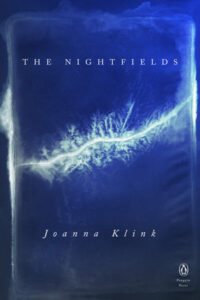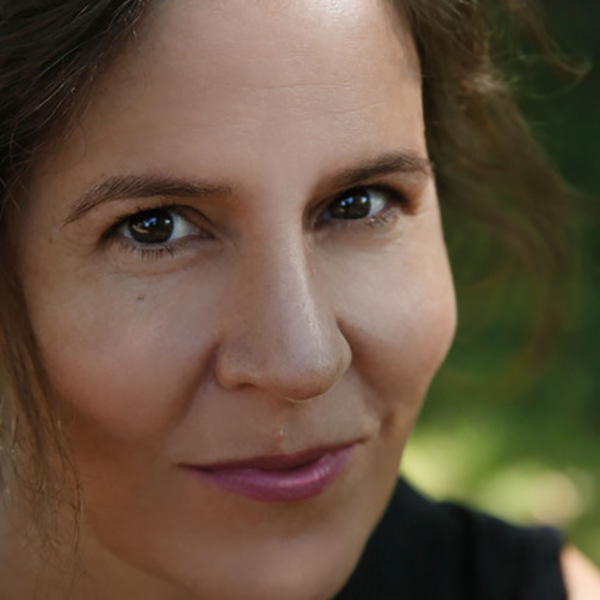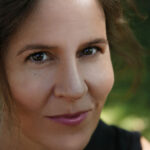Reviewed by Joannie Stangeland

by Joanna Klink
ISBN 9780143135395
2020, Penguin Poets
$20, 112 pages, Paper
Imagine yourself standing, at night, in a field. Imagine the fields of stars overhead. Now feel that field inside you. The poems in Joanna Klink’s latest collection, The Nightfields, move between external surroundings, unseen forces, and internal conversations. They impart a sense of distance and emptiness, a grounding in loss. In “On Diminishment,” Klink observes, “It is possible to walk / far into another / and find only / yourself.”
Klink dedicates the book to her father, which sets an elegiac tone throughout the poems. In “On Mercy,” Klink writes, “Between dawn and drifting, I sense the coming / loss of those I have needed most.” Another poem ends with “Somewhere there is a field, / white and quiet, where a tree / like this one stands, // made entirely of / hovering. Nothing will / hold me up like that again.”
The Nightfields is an assemblage of questions. In “The Infinities,” Klink writes, “What / were you looking out for? / What did you dismiss / along the way.” In “Almanac,” she asks, “What will you admit / into your life? Will that station be / held by you—to be alive as you’re living.” The marked questions might be directed to another person, or to the reader, while the unmarked questions are turned inward, making a three-way conversation that invites contemplation.
Lists pressure the relationships between images, setting up fields of energy and resonance: “We were given some salt, a warehouse a river,” “I was given / the smell of new rain, a small stack of paper, / some gold leaf and glue.” Then the question: “If you were given some yarn, / some wire, if you were given a whole night of snow, / would you even know how to hold it.” In “Cancer (Prayer for My Father),” Klink describes her father as “the concert of bright strings, / the sudden gentleness of moss, / the tyrant opinion, a confusion of medications.”
The final sequence, “Night Sky,” spans thirty-one poems. In her Notes, Klink defines the voice as “speaking to a person looking out at the night sky.” While it was inspired, Klink says, by James Turrell’s Roden Crater large-scale artwork at an extinct volcano in northern Arizona, the poems travel to other locations, other spheres of experience. Again, the speaker and the listener become mutable. Again, the poems have an elegiac gravity and a wonder for the world: “And this is how / a whole life unfolds—in minutes too painful and rich / for you to bear them.”
To spend time with these poems is to wander through immense solitudes and images layered densely like a star about to collapse. “We breathe, and then are gone—” Klink writes, “disappeared into land, whose volcanic glass / feels cool to the touch. And is black, and is astral.” These poems in The Nightfields create a portal to our inner constellations.
Published in Cider Press Review, Volume 23, Issue 5.
See all items about Joannie Stangeland
Visit Joannie Stangeland’s contributors page.
See all items about Joanna Klink
Visit Joanna Klink’s contributors page.


 Joannie Stangeland is the author of several collections of poetry, most recently The Scene You See. Her poems have also appeared in Prairie Schooner, New England Review, Boulevard, and other journals. Joannie holds an MFA from the Rainier Writing Workshop.
Joannie Stangeland is the author of several collections of poetry, most recently The Scene You See. Her poems have also appeared in Prairie Schooner, New England Review, Boulevard, and other journals. Joannie holds an MFA from the Rainier Writing Workshop.
 Joanna Klink is the author of five books of poetry. She has received awards and fellowships from the Rona Jaffe Foundation, Jeannette Haien Ballard, Civitella Ranieri, the Bogliasco Foundation, the American Academy of Arts and Letters, the Trust of Amy Lowell, and the John Simon Guggenheim Memorial.
Joanna Klink is the author of five books of poetry. She has received awards and fellowships from the Rona Jaffe Foundation, Jeannette Haien Ballard, Civitella Ranieri, the Bogliasco Foundation, the American Academy of Arts and Letters, the Trust of Amy Lowell, and the John Simon Guggenheim Memorial.


